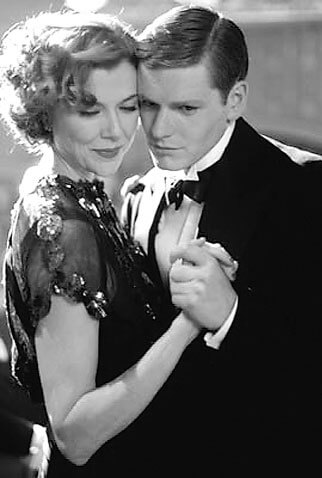VOLUME 3, ISSUE 344 | October 28 – November 3, 2004
FILM
BEING JULIA
Directed by Istvàn Szàbo
Sony Pictures Classics
Playing citywide
Maugham Gem Comes a Cropper
‘Being Julia’ demonstrates the perils of period piece adaptations
Could any man, with the possible exception of Tennessee Williams, write better roles for women than W. Somerset Maugham? Fascinating, multi-layered female personalities dominate works like “Of Human Bondage,” “Rain,” “The Letter,” “The Razor’s Edge” and “Theatre,” which has been made into the film, “Being Julia.” Maugham was uncannily able to get under the skin of his adulterous wives, murderesses and harlots, both redeemed and unredeemed, with the deft mastery of the most discerning psychologist.
Julia Lambert, the heroine of “Theatre” is one of Maugham’s richest creations, perhaps the greatest portrait of an actress in all English literature, but, sadly, Annette Bening is not up to the part, and furthermore her efforts are swamped by a production that is but a vulgar bowdlerization of the novella.
Julia is the most celebrated actress in London, contentedly married to her manager, Michael Gosselyn (Jeremy Irons), the handsomest man of his day, and mother of a devoted son, Roger (Thomas Sturridge). Against her will, she falls in love with a much younger, penniless American, Tom Fennel (Shaun Evans), who turns out to have his eye decidedly on the main chance as well as another woman. She is Avice Crichton (Lucy Punch), an aspiring actress who has been cast in Julia’s latest play. Seething with jealousy and bruised ego, Julia determines her revenge on both and, making an onstage fool of the primed-for-success Avice, she triumphs in a vehicle tailor-made for her.
Where the book was a scrupulously observed study of Julia’s and Michael’s early lives and careers and successful partnership in the London theater world of 1937, the film focuses strictly on her wayward affair. This might have been a scintillatingly fluffy divertissement had the filmmakers approached it with anything resembling wit or style. But Ronald Harwood’s script turns the material into unfunny buffa, and the direction—in need of the gossamer hand of a George Cukor or even what Stephen Fry recently disclosed in his disarming “Bright Young Things”—is by Istvàn Szàbo. To describe him as heavy-handed would be understating it, and, consequently, the entire tone of the piece is stridently uneven, veering from Masterpiece Theatre stodginess to shriekingly obvious hysteria. Julia’s revenge on Avice is given thumpingly hard emphasis and you can only feel sympathy for the poor actress, who is so grossly humiliated at such length, a matter which Maugham suavely polished off in a few paragraphs.
In this very Margo Channing-like role, Bening strives mightily to be another Gertrude Lawrence, Tallulah Bankhead or Gladys Cooper. Lacking the deliciously fluid, camp grace of the first, the witty sex appeal of the second and devastatingly incisive classic beauty of the third, she substitutes an overdone British accent and explosively strenuous mugging, the very opposite of glamour. Ineffably American, Bening was unparalleled playing the knowing trollops of “The Grifters” and “Bugsy,” but this role is simply beyond her, and the praise she has received merely proves how aesthetically challenged are so many contemporary critics. You think, “What a waste,” especially as the minor part of Julia’s maid is played by the marvelous Juliet Stevenson, who easily acts rings around Bening, and should have switched roles with her.
Irons is utterly wasted, especially as Harwood has ham-handedly inserted the ghost character of Julia’s early dramatic mentor (Michael Gambon, chewing scenery as usual) who mouths much of the insightful dramatic advice Maugham originally gave to Michael.
Evans gives the freshest performance, and manages to make quite appropriately sexy this bit of common clay who, disconcertingly, has Julia so powerfully under his sway. There are two gay characters which were drawn with infinitely more perception in Maugham’s original: Lord Charles (Bruce Greenwood), who rebuffs Julia’s attempted seduction for obvious (to everyone but her) reasons, and Dolly de Vries (Miriam Margolyes), a lesbian producer, besotted by Julia.
Maugham (1874-1965), the most successful novelist of his time, had lived through the era of Oscar Wilde’s criminal trial, remained resolutely closeted throughout his life and was the inspiration for Noel Coward’s “out” play, “A Song at Twilight,” which appeared a year after Maugham’s death. The major love of Maugham’s life was the tortured, alcoholic Gerald Haxton, American and 18 years younger, whom he met while serving in the Red Cross during the First World War. Their affair became intolerable to Maugham’s wife, Syrie, a celebrated interior decorator, and, amid scandal, they divorced in 1928. Maugham moved to the French Riviera with Haxton, who had been deported from England as an undesired alien. Maugham’s celebrity was a source of embitterment to Haxton, who died in 1944 in an alcoholic ward, and Maugham shocked and dismayed many of his friends in 1962, when he published “Looking Back,” which contained a virulent attack on his ex-wife. Before his death, Maugham burned all of his unpublished manuscripts and begged his friends to destroy his letters.



































